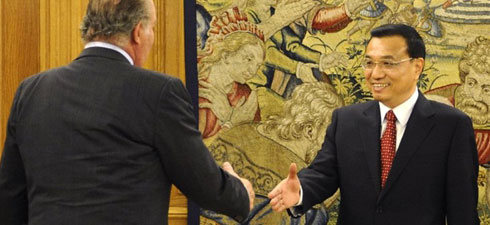"The Chinese comrade, Zapatero’s best ally," El Mundocalls Chinese vice-premier Li Keqiang, currently on a visit to Spain that is of crucial importance to the future of the Spanish economy. José Luis Zapatero’s government "are crossing their fingers in hopes that China will continue breathing life” into the Spanish economy in 2011, says the conservative daily, adding that Beijing has signed deals with Madrid worth €5.5bn. Moreover, China has already purchased upwards of €43bn in Spanish government bonds and “seems prepared to buy more” – with an instant impact on the Spanish debt risk premium, which dropped 9 points on 4 January.
El Mundo nonetheless airs criticism of Zapatero’s "acquiescence", now that he has found “his best allies in these hard times” among the hierarchs of the Communist dictatorship, and hopes the prime minister will follow the lead of Angela Merkel and Nicolas Sarkozy, "who didn’t hesitate to call on China to respect human rights".
Spain is not an isolated case in Beijing’s European strategy, observes Dziennik Gazeta Prawna over in Poland: "Every month China has been buying up EU government bonds to the tune of €7-8bn in a bid to shore up Chinese exports for good. By helping the ‘PIGS’ (Portugal, Ireland, Greece, Spain),” adds the Polish paper, “China is getting to know the European market and, more importantly, indirectly influencing the euro exchange rate, as well as weakening its arch-rival, Germany, while it’s at it.”
To reassure the latter, as a matter of fact, the selfsame Li Keqiang has penned an op-ed piece in the Bavarian paper Süddeutsche Zeitung hailing the "joint struggle against the crisis conducted over the past two years by China and Germany” and stressing the huge scale of trading between the two countries: "$140bn in 2010, which corresponds to 30% of trade between China and the EU" and makes China Germany’s foremost trading partner outside the EU. By reaching out to the most heavily indebted countries, Beijing is also hoping to ward off sanctions from Brussels for dumping (the Commission has filed 50 actions for unfair trading against China), explains analyst Yiyi Lu in Dziennik Gazeta Prawna. He points that at the same time Beijing is demanding that the EU grant it market economy status and ease up on the preconditions for the transfer of cutting-edge technologies. The next step, concludes Yiyi Lu, will probably be the lifting of the embargo on arms sales to China that was imposed by the EU after the 1989 Tiananmen Square massacre.
Translated by Eric Rosencrantz
Was this article useful? If so we are delighted!
It is freely available because we believe that the right to free and independent information is essential for democracy. But this right is not guaranteed forever, and independence comes at a cost. We need your support in order to continue publishing independent, multilingual news for all Europeans.
Discover our subscription offers and their exclusive benefits and become a member of our community now!












